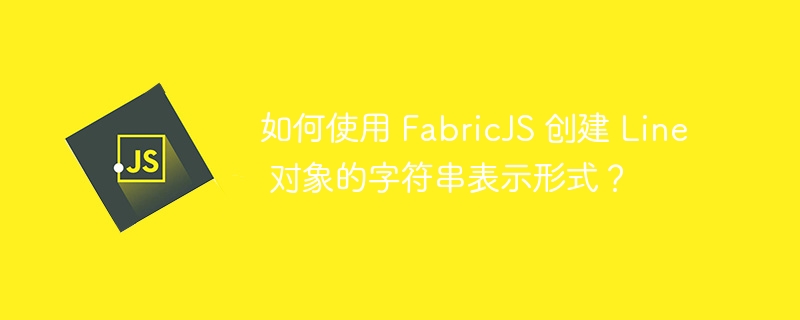所属分类:web前端开发

在本教程中,我们将学习如何使用 FabricJS 创建 Line 对象的字符串表示形式。 Line 元素是 FabricJS 中提供的基本元素之一。它用于创建直线。由于线元素在几何上是一维的并且不包含内部,因此它们永远不会被填充。我们可以通过创建 fabric.Line 实例来创建线条对象,指定线条的 x 和 y 坐标并将其添加到画布中。为了创建 Line 对象的字符串表示形式,我们使用 toString 方法。
toString(): String
让我们看一个代码示例,以查看使用 toString 方法时记录的输出用来。在这种情况下,将返回线条实例的字符串表示形式。
<!DOCTYPE html>
<html>
<head>
<!-- Adding the Fabric JS Library-->
<script src="https://cdnjs.cloudflare.com/ajax/libs/fabric.js/510/fabric.min.js"></script>
</head>
<body>
<h2>Using the toString method</h2>
<p>
You can open console from dev tools and see that the logged output contains the String representation of the line instance
</p>
<canvas id="canvas"></canvas>
<script>
// Initiate a canvas instance
var canvas = new fabric.Canvas("canvas");
canvas.setWidth(document.body.scrollWidth);
canvas.setHeight(250);
// Initiate a Line object
var line = new fabric.Line([200, 100, 100, 40], {
stroke: "blue",
strokeWidth: 20,
});
// Add it to the canvas
canvas.add(line);
// Using the toString method
console.log(
"String representation of the Line instance is: ",
line.toString()
);
</script>
</body>
</html>
让我们看一个代码示例,看看如何通过查看两个对象各自的字符串表示来比较它们。在这里,我们初始化了一个线实例和一个矩形实例。在对每个对象应用 toString 方法时,我们可以在控制台中看到它们各自的字符串表示形式。
<!DOCTYPE html>
<html>
<head>
<!-- Adding the Fabric JS Library-->
<script src="https://cdnjs.cloudflare.com/ajax/libs/fabric.js/510/fabric.min.js"></script>
</head>
<body>
<h2>Using toString method to compare two different elements</h2>
<p>
You can open console from dev tools and see that the logged output contains the String representation of the line instance and the rectangle instance
</p>
<canvas id="canvas"></canvas>
<script>
// Initiate a canvas instance
var canvas = new fabric.Canvas("canvas");
canvas.setWidth(document.body.scrollWidth);
canvas.setHeight(250);
// Initiate a Line object
var line = new fabric.Line([200, 100, 100, 40], {
stroke: "blue",
strokeWidth: 20,
});
// Initiate a Rectangle object
var rect = new fabric.Rect( {
stroke: "red",
strokeWidth: 20,
width:20,
height: 50,
left: 400,
top: 55
});
// Add them to the canvas
canvas.add(line);
canvas.add(rect)
// Using the toString method
console.log(
"String representation of the Line instance is: ", line.toString()
);
console.log(
"String representation of the Rectangle instance is: ",
rect.toString()
);
</script>
</body>
</html>